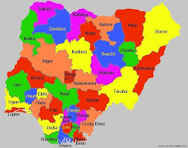By Sam Ijoho
Nigeria is not just a country battling economic woes or political instability – she is a nation wrestling with identity, memory, and meaning. More than six decades after independence, we are still circling the same mountain of dysfunction, betrayal, and broken promises. We chant slogans, elect “new” leaders, amend budgets, and rewrite constitutions – yet somehow, the centre continues to wobble.
We blame corruption. We blame insecurity. We blame poor governance – and rightly so. But perhaps it’s time we looked beyond the surface noise and asked deeper, more uncomfortable questions like:
– What are the real forces breaking Nigeria from within?
– Why do we keep getting it wrong, even when we seem to know what is right?
This piece is not an attack on government, nor is it a sermon of despair. It is a mirror – held up to all of us: elite and ordinary, young and old, North and South. It is a call to name the things we often ignore: the subtle crises, cultural contradictions, and deeply rooted habits that no policy can fix unless we first admit they exist.
Only a nation that dares to be honest with itself can dare to heal.
1. Disunity And Ethno-Religious Fragmentation: Nigeria is yet to become a true nation. What we have is a federation of mutual suspicions. People identify first as Igbo, Hausa, Yoruba, Tiv, or Ijaw – and only reluctantly as Nigerians. Religion and region often take precedence over shared national identity. This deep-seated division fuels conflict, marginalization, and a politics of exclusion that undermines our collective potential.
2. Linguistic Elitism and the Hollowing of Education: We’ve confused eloquence with wisdom. In many spaces, grammar has become a tool of intimidation, not communication. Nigerians love to speak big grammar, even when there’s little substance beneath. We’ve built a culture where verbosity is prized over clarity, and form is often mistaken for depth. This is not a fruit of education – it’s ego in disguise. And it’s killing real problem-solving.
3. Elite Arrogance And The Sidelining Of Sincerity: Those who govern and make policy often surround themselves with flatterers, not patriots. Competent people who are not sycophantic are often ignored or labeled as threats. We see qualified citizens sidelined in favour of loyal praise-singers. In such an environment, sincerity is punished, mediocrity is rewarded, and poor decisions become the norm.
4. Institutional Weakness And The Politics Of Disruption: There’s hardly any continuity in Nigeria’s public administration. Every new government feels the need to erase the legacy of its predecessor – even at the expense of national development. Policies are discarded before they mature. Projects are abandoned midway. Institutions become victims of political ego, rather than pillars of progress.
5. The Weaponization Of Poverty: Poverty has become a strategic tool, not a problem to solve. Politicians keep people hungry because it makes them easier to control – especially during elections. True empowerment is feared because it leads to enlightenment, and enlightened people are harder to manipulate. So the poor are pacified with handouts, not uplifted with opportunities.
6. Youth Misdirection and Cultural Confusion: Many young Nigerians are caught in a strange vortex – stuck between fading traditional values and a toxic digital culture driven by superficial trends. Role models are often influencers, fraudsters, and overnight celebrities. Without strong cultural anchors or institutional support, the youth drift into mimicry, distraction, and escapism. Potential is lost to performance.
7. Absence Of Meritocracy: Nigeria is still a place where who you know matters more than what you know. Job Opportunities, Employments and Appointments are based on familiarity, not competence. Contracts are awarded to connections, not capability. This culture of nepotism has buried innovation, driven talent abroad, and left many of our best minds frustrated or forgotten.
8. Short-Term Thinking And The Addiction To Speed: There is an unhealthy obsession with instant results. Leaders want quick wins they can take credit for and use during campeign. Investors want immediate returns. Citizens want overnight transformation. But real nation-building requires patience, vision, and long-term thinking – three things we’ve consistently lacked across sectors and generations.
9. Disregard For Data And Disdain For Expertise: Data is often ignored. Expertise is mistrusted. Professionals are sidelined if their advice contradicts political interests. Reformers are dismissed as troublemakers. In this environment, policies are driven by impulse, not insight – and the result is predictable – chaos.
10. Poor Civic Culture And The Abdication Of Responsibility: Most Nigerians still see government as “them” rather than “us.” Civic engagement is low. Civic responsibility is even lower. We dump refuse in gutters, block drainage and blame the government for the floods. We demand rights but neglect duties. Until we develop a sense of shared ownership, even the best governments will fail.
– Nigeria Must Be In Motion
The crisis we face is not merely political. It is cultural, psychological, and generational. We’ve normalized dysfunction. We’ve glamorized mediocrity. We’ve silenced truth-tellers and recycled the same script with different actors (sometimes we recycle the same actors) – each time expecting magic where only method and discipline can birth real change.
This is not just about failed leadership. It is also about broken followership, weakened systems, and a distorted understanding of what it means to be a nation. Until we confront these internal contradictions, we will keep treating bullet wounds with band-aids.
Nigeria doesn’t need another messiah. She needs citizens – awake, united, and unafraid to choose:
Competence over connection
Clarity over grammar
Truth over tribe
We must stop blaming ghosts… and start facing the people in the mirror. Only then can we begin to break free from the invisible chains we’ve worn for far too long.



